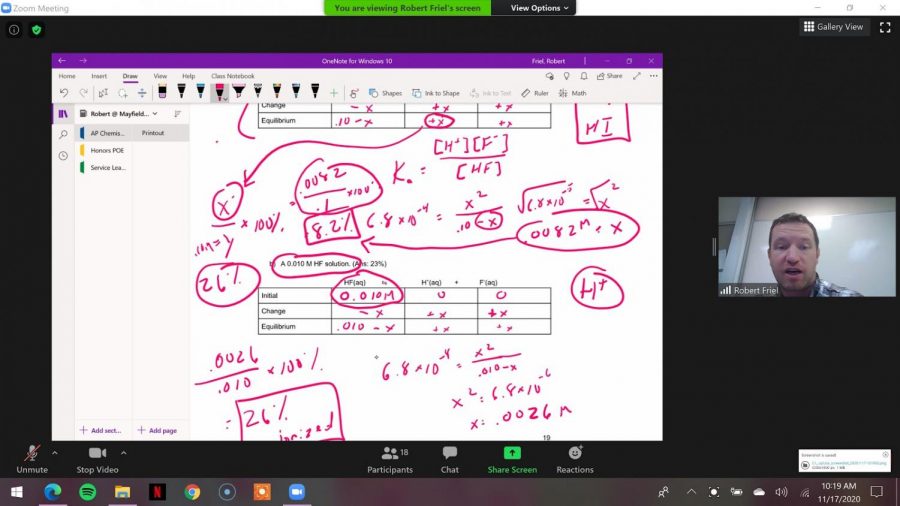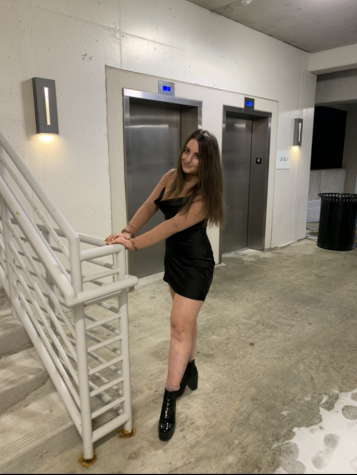Chemistry class adjusts to challenges despite pandemic
Bob Friel teaches his students essential Chemistry concepts for the AP test over a Zoom call.
December 8, 2020
With the recent change of all students going remote until early December, Bob Friel’s AP Chemistry 2 class is adapting to the ever-changing situation with their learning.
Friel, who is teaching both years of the class, says he finds it very beneficial to have a two-year-long class during the pandemic. “I’ve gotten to know students’ personalities, learning styles, how they learn best, their strengths and weaknesses. In a normal class, it can take a whole semester to work out those kinks, so to enter from day one with a trust and a comfort level is really reassuring,” he said.
He admits he’s taken an approach of instead of focusing solely on the rigorous content, but to delve deeper into students’ emotions and make sure that everyone feels comfortable, especially during the trials and tribulations with the pandemic.
Friel believes that it is important to form deep and personal relationships with students, and he thinks that the longer class was the best thing for that. He said, “Getting to know students through a screen is unnatural, it’s uncomfortable, and it’s challenging. So, when we departed in the middle of March, I really made an effort to not just teach content, but to at least attempt to support our classes more on a social level”.
After much reflection, Friel believed he found the perfect solution to stay connected to his students. “I think some of the efforts that were done, whether doing a class journal, students felt free to share things that weren’t necessarily related to the class, have really helped form the basis,” he said.
Kaylie Cornelius, a junior in her second year of the class, feels that Friel is doing a great job to support his students during this unprecedented time. “He is working to make sure everyone has the packets, and he pays a lot of attention to both the online kids and in-person kids. Now that we’re all online, he’s super understanding of the fact that we’re in our houses and we have pets, and if we have to go to the bathroom, he’s just super chill and realizes that we’re not in the classroom, and it’s okay if you eat in class,” she said.
Ethan Fong, also a junior in year two of AP Chemistry, believes that Friel is excelling by not only the teaching standpoint, but also the safety standpoint. He said, “I’d say he’s doing a good job because I know in my other classes, I can honestly say the online students get significantly less attention most of the time. Also, from a safety point of view, he’s good about wiping stuff down and keeping everyone distanced”.
Despite all he is doing for his students, Friel still experiences challenges while deciding how to provide instruction to his class, but he found the best way was to hold off on lab work for now. “We are opting to not do a lot of labs right now, and I wish we could do more hands-on activities. The rationale is with the hopes that our whole class will be back in person in February or March, because it’s very difficult to simulate an in-person AP Chemistry lab. It’s almost impossible to recreate,” he said.
Although Friel prefers teaching students in person, he does realize there are numerous benefits to remote instruction, including being more personable from a distance. “I do like that students can more easily get up, walk, [and] use the restroom. There’s more freedom, and I think sometimes people are more free to share things when there is distance.”
After much thought, Friel came up with an idea of how students could feel heard, even during a time when they were often silenced. “I noticed that when we had our journal, students felt more free to write and I got to know them more. I have enjoyed sharing things through writing with my students,” he said.
Cornelius admits that the two-year curriculum can be quite frustrating at times. She said, “I have a bunch of classes that I need to take, and my schedule is super packed, so the fact that I have to take it for two years to get the credit can be annoying, since I don’t have space in my schedule as it is.”
Fong, who likes the two-year structure, shares that academics have a much larger burden on the students while being online for all classes, not just chemistry. He said, “There is more responsibility on the student than there ever has been. We’re not in class for teachers to remind us of assignments, and there’s a greater responsibility to focus in class, since you can basically do what you want. A lot of times you have to teach yourself, it’s just how it is at this point.”
In the end, Friel always tries to see the silver lining in every situation by making it more than just about mastering the curriculum. He said, “[because of remote learning], students learn to advocate for themselves, learn how to write emails, sometimes even interrupting, and managing their time. You have to have initiative and persistence to not waste time.”























































